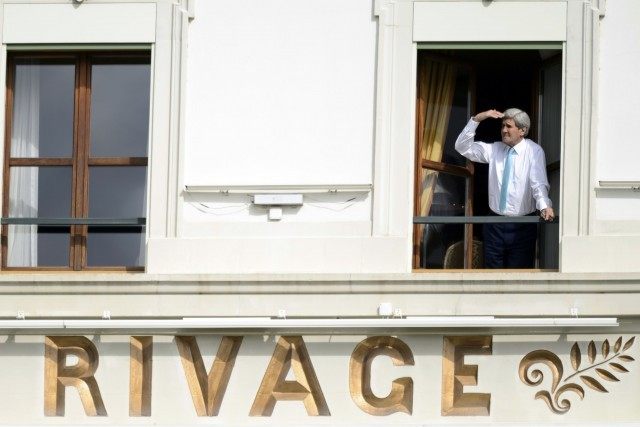Once again, the Iran deal confirmed by diplomats in Lausanne, Switzerland has failed to materialize. And the only thing more pathetic than the repeated collapse of the talks is the spectacle of U.S. Secretary of State John Kerry staying on, even after diplomats from China, Russia, France and Germany have packed their bags and gone home. He is simply unwilling to admit failure. But the Iranian regime is happy to entertain his illusions, and so their delegation has stayed behind, too.
At this stage, the best Kerry can hope for is some kind of memorandum outlining areas of agreement in the broader terms, and a photo-op for the cameras that will minimize the embarrassment to him and to President Barack Obama. He is not in any position to negotiate additional concessions on behalf of the P5+1 (though he may try). He will try to put a brave face on the conference and remind reporters that the final deadline is July 1–then hope Congress sits on its hands until then.
Why are the Iranians holding out? They have won so many concessions–including an agreement to allow continued enrichment at an illegal underground facility–that it seems logical for them to take their winnings off the table. By going “all in,” and demanding immediate sanctions relief as well as the right to retain their enriched uranium stockpile, Iran is–at least theoretically–risking a total collapse of the talks, and potentially missing an opportunity to lock in their gains.
Clearly, the Iranian regime believes that the Obama administration will not go to war, and that it will not back an Israeli strike, either–meaning that Iran probably has the leverage to pick up future negotiations where these talks have left off. All it needs to do is flatter Obama–which is why it is in Iran’s interest to play along with Kerry even as it denies him the prize. But in the background, the Iranians surely understand that there is a real deadline, beyond the talks: January 20, 2017.
That is the last day that President Obama will be in office. And his replacement, whether Democrat or Republican, is going to be less pliable. The trick, for Iran, is to drag the talks out for as long as possible without allowing them to be deferred to the next administration, when its leverage will be diminished significantly. (Recall that Iran released the U.S. hostages on the day President Ronald Reagan took office in 1981, after having negotiated carefully with a defeated Jimmy Carter.)
There is another possibility: namely, that Iran could be far closer to a nuclear weapon than the world currently knows. That could explain why Iran keeps ratcheting up its demands every time a deal creeps closer (that, and Obama’s appeasement). Iran may not fear the P5+1 leaving the table because it may already possess much of what the P5+1 are hoping to prevent it from building. Deal or no deal, it could test a nuclear bomb the day Kerry finally goes home–and blame him for leaving.

COMMENTS
Please let us know if you're having issues with commenting.